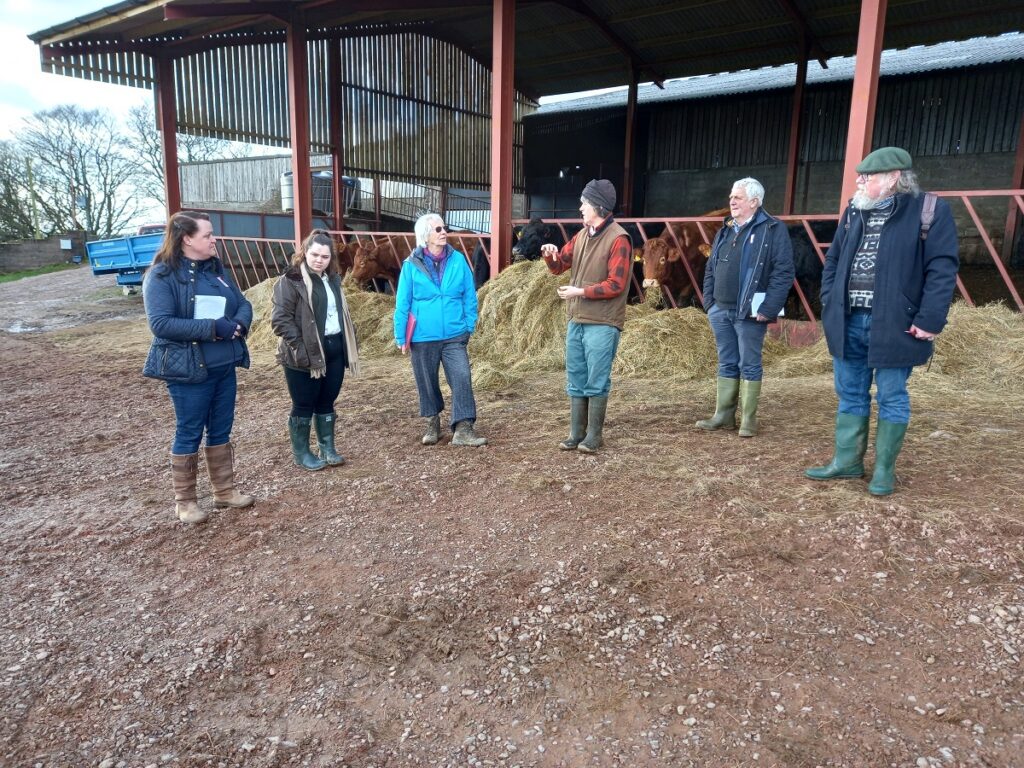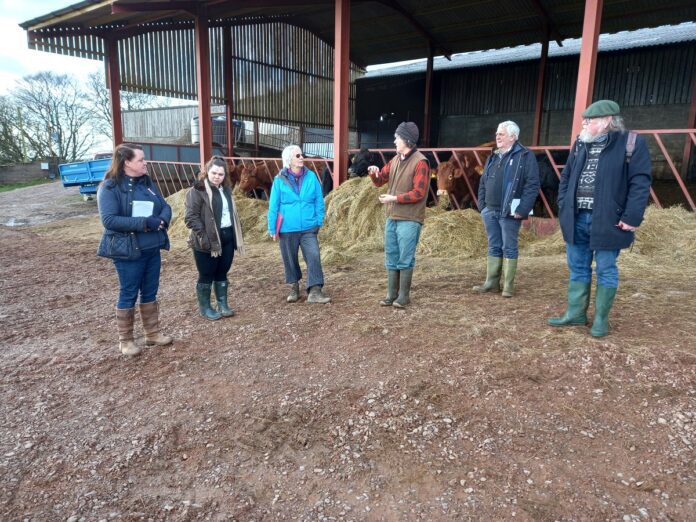Farmers from Glamorgan and Farmers’ Union of Wales (FUW) officials have discussed food procurement and school meals with Cardiff Central Member of the Senedd Jenny Rathbone, when they met at a local farm recently.
Hosting the meeting was FUW Glamorgan member Charlotte Llewellyn, who farms 225 acres at Cefn Colstyn Farm, Pentyrch, on the outskirts of Cardiff.

Here Charlotte farms 25 purebred limousin suckler cows and 64 meatlinc cross breeding ewes. There is also the addition of tack sheep and horses on the land at various times of the year which is a much needed reliable source of income. The lambs are sold privately through a meatbox scheme. The farm is organic and fertiliser hasn’t been used at Cefn Colstyn for approximately 30 years.
Cefn Colstyn Farm is stocked with the amount of animals it can grow grass for and Charlotte encourages nitrogen fixing plants like Red Clover and Birds Foot Trefoil as it acts as a natural wormer.
Showing the local MS around and discussing food production on the farm and in Wales, Charlotte Llewellyn said:
“I farm organically here and our livestock are raised to leading health and welfare standards. We farm with biodiversity in mind and haven’t used manufactured fertiliser on the farm for nearly three decades. Our food should be in every school, canteen, nursing home and hospital across Wales.
“What is a concern though when we talk about local food production is that our small abattoirs have nearly all gone. The UK in fact has lost 90% of its abattoirs and there are concerns that what is left will close in the next five years if nothing is done. If that happens we will lose further opportunities to provide local food and supply niche markets.”
FUW Glamorgan County Chairman Richard Walker, who also attended the visit, said:
“The Covid-19 pandemic has shown us how sensitive food supply chains and the Welsh agricultural industry can be to sudden changes in global markets. It also showed us the importance of maintaining a strong domestic production base so we can supply commodity products to UK domestic markets.
“With trade deals being negotiated across the world, we must grasp the opportunity to look after our food producers here at home and put our money where our mouth is. Procuring food locally is one way of doing that and publicly funded authorities should lead the way.”
Union officials further stressed that whilst the proportion of local produce procured by some public bodies has increased over recent years, there remain significant numbers of administrations which fail to support Welsh agriculture, choosing instead to accept produce from countries which often fail to meet the high production standards which are a requirement in Wales.
Moreover, the nature of some procurement contracts means that what appears to be a commitment to procuring Welsh and British produce within procurement rules can be circumvented by carefully worded clauses.
FUW Gwent and Glamorgan Policy Officer Libby Davies added:
“Public procurement of food provides an opportunity to shorten supply chains, support the high production standards Welsh farmers must adhere to, invest in Welsh businesses and avoid the negative externalities of the consumption of cheap imported food on Welsh citizens and the environment. This aligns with the aspirations of the Welsh Government’s Agriculture (Wales) White Paper and the Well-being of Future Generations Act.
“The FUW therefore expects to see leadership from the Welsh Government in ensuring the public and private procurement of Welsh produce alongside fairness throughout the supply chain by supporting Wales’ producers, processors and abattoirs – especially with the free school meals plan in place.”
Help keep news FREE for our readers
Supporting your local community newspaper/online news outlet is crucial now more than ever. If you believe in independent journalism, then consider making a valuable contribution by making a one-time or monthly donation. We operate in rural areas where providing unbiased news can be challenging. Read More About Supporting The West Wales Chronicle























